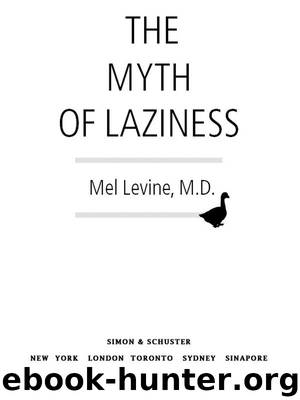The Myth of Laziness by Mel Levine M.D

Author:Mel Levine, M.D.
Language: eng
Format: epub
Publisher: Simon & Schuster
Published: 2003-07-15T00:00:00+00:00
Figure 7-1. This template can be used to help a student come up with personal reactions to information conveyed in a book or article. Such a technique can be used to encourage active processing of reading material and sharp critical thinking.
A couple of years ago I visited a seventh-grade science class at a middle school in Harlem. We were there in collaboration with WGBH in Boston to film a video library on learning issues. One particular student, Arnaldo, looked conspicuously confused while his dynamic teacher was lecturing on various forms of energy. But when the teacher asked the kids to design a heating system for a house with no source of electrical energy, the challenge jump-started Arnaldo’s brain. He eagerly reached for some paper and crayons and quickly sketched a typical rectangular New York apartment house, on the outside of which he created a complex network of ducts and pipes. When I asked him what that apparatus was, he explained that the conduits would carry water that would be heated by the sun, then stored inside water tanks, and so on. As he drew up his plan, he saw some troubling impasses in his ideas.
During an interview we taped after class, I pointed out to Arnaldo that I thought he was probably a hands-on kind of guy. He liked to do his thinking while he was producing something. He laughed and in his almost musical Hispanic accent he agreed completely. This early adolescent was an active problem solver. He learned by creating. His teacher mentioned that Arnaldo failed most quizzes but was fantastic at doing projects; he was just the opposite of Roberta. This was a high-output guy, not about to star on multiple-choice tests, yet quite possibly destined to be an impressively productive and inventive worker (if he gets the opportunities he deserves). He was a great kid, but I feared for him when I thought of end-of-grade testing.
The production of ideas is a critical ingredient of much high-quality output. Sometimes students like Roberta fail to receive sensitive help with ideation, so they may miss out on a crucial aspect of education. They may be rewarded over and over for their mastery of knowledge and skills without sensing the need to build up their ideational richness and fluency in the ways I have cited in this chapter. Using writing as the prototype, Roberta and the many others like her should discover that the goal is not merely to report knowledge but to transform it in some constructive way. It is through such transformations that individuals experience fun and satisfaction while making insightful contributions.
A couple of years later I received a call from the head of Roberta’s school asking me to come back and make another presentation. I asked how Roberta was faring as a senior in high school. I was informed that she had survived some rough times. When she was in eleventh grade, Roberta’s father had died unexpectedly of heart failure. His art gallery, which had been on the verge of bankruptcy, had accumulated substantial debt and closed down.
Download
This site does not store any files on its server. We only index and link to content provided by other sites. Please contact the content providers to delete copyright contents if any and email us, we'll remove relevant links or contents immediately.
The Motivation Myth by Jeff Haden(5212)
Audition by Ryu Murakami(4930)
Adulting by Kelly Williams Brown(4574)
The Confidence Code by Katty Kay(4260)
A Mind For Numbers: How to Excel at Math and Science (Even If You Flunked Algebra) by Barbara Oakley(3307)
Waiting in the Wings by Melissa Brayden(3219)
Self-Esteem by Matthew McKay & Patrick Fanning(3144)
Fooled by Randomness: The Hidden Role of Chance in Life and in the Markets by Nassim Nicholas Taleb(3124)
The ONE Thing by Gary Keller(3071)
Nice Girls Don't Get the Corner Office by Lois P. Frankel(3044)
The Dictionary of Body Language by Joe Navarro(2996)
How to be More Interesting by Edward De Bono(2791)
Designing Your Life by Bill Burnett(2747)
Getting Things Done by David Allen(2701)
The Plant Paradox by Dr. Steven R. Gundry M.D(2620)
Police Exams Prep 2018-2019 by Kaplan Test Prep(2548)
What Color Is Your Parachute? 2015 by Richard N. Bolles(2311)
Dangerous Personalities by Joe Navarro(2289)
When to Jump by Mike Lewis(2241)
